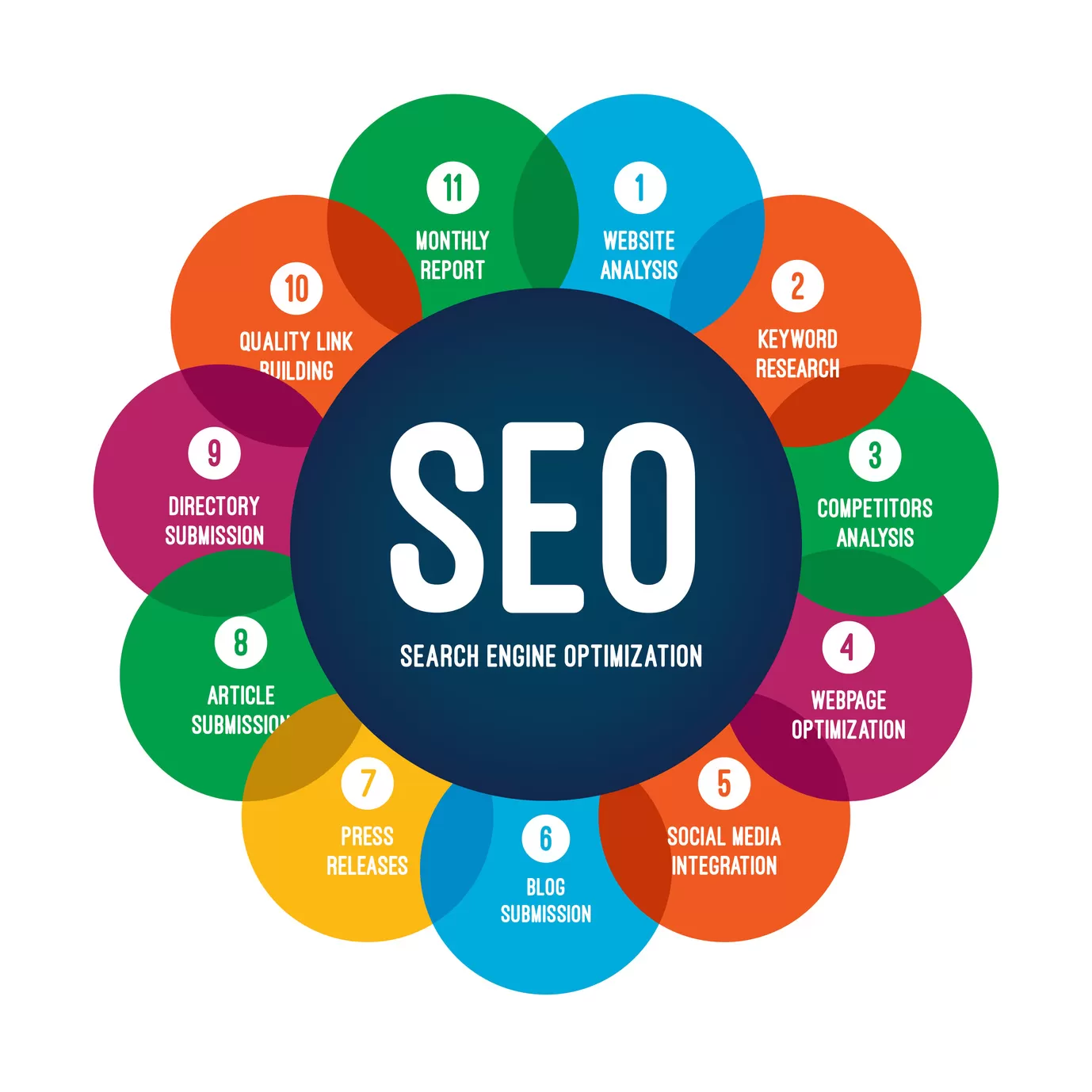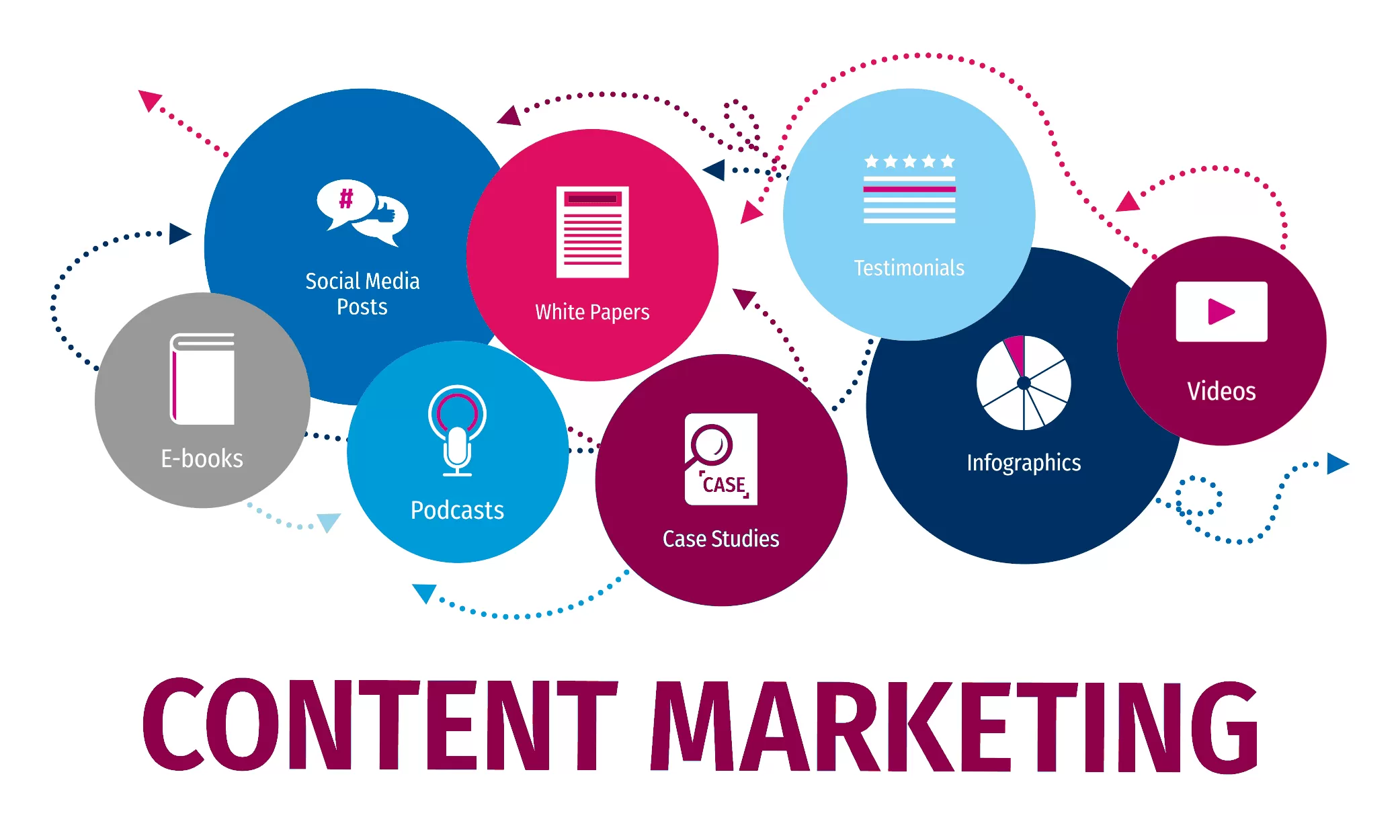In the digital age, businesses must prioritize effective online marketing strategies to achieve rapid growth. This comprehensive guide outlines key strategies that can help propel your business toward success.
Understanding Your Audience
Understanding your audience is the first step to crafting a powerful online marketing strategy. Conduct market research to identify your target demographic, preferences, and online behavior.
Search Engine Optimization (SEO)
SEO is optimizing your website to rank higher on search engine results pages. Integrating relevant keywords and providing quality content can attract organic traffic, enhancing your visibility and credibility.

Types of SEO
There are several types of SEO (Search Engine Optimization) techniques that are commonly used to improve a website’s visibility and ranking in search engine results. Here are some of the main types of SEO:
On-Page SEO:
On-page SEO refers to optimizing individual web pages to improve their search engine rankings and attract relevant organic traffic. This includes optimizing elements such as meta tags, headings, content, URL structure, keyword usage, internal linking, and image optimization.
It might be useful for you : Optimizing CSS/HTML/JS Files to Improve Website User Experience
Off-Page SEO:
Off-page SEO involves activities that are done outside of the website to improve its search engine ranking. The primary focus of off-page SEO is to build high-quality backlinks from other reputable websites. This can be achieved through strategies such as link building, social media marketing, influencer outreach, guest blogging, and online reputation management.
Technical SEO:
Technical SEO involves optimizing the technical aspects of a website to make it easier for search engines to crawl, index, and understand its content. It includes optimizing website speed, mobile responsiveness, URL structure, XML sitemaps, robots.txt, canonical tags, schema markup, and ensuring proper website architecture.
Local SEO:
Local SEO focuses on optimizing a website to rank higher in local search results. It is particularly important for businesses that have a physical location and want to attract customers from their local area. Local SEO techniques include optimizing Google My Business listing, building local citations, getting online reviews, and targeting location-specific keywords.
E-commerce SEO:
E-commerce SEO is specifically tailored for online stores and aims to improve their visibility in search engine results for relevant product searches. It involves optimizing product descriptions, images, user reviews, site structure, navigation, and implementing structured data markup for products.
Voice Search Optimization:
With the increasing popularity of voice assistants and smart speakers, voice search optimization has become important. It involves optimizing website content to target long-tail conversational queries and providing concise, direct answers to voice search queries.
Video SEO:
Video SEO focuses on optimizing video content to improve its visibility in search engine results, particularly in video search engines like YouTube. It involves optimizing video titles, descriptions, tags, thumbnails, closed captions, and promoting videos through social sharing and embedding.
Social Media Marketing
Social media platforms offer excellent avenues to reach a wider audience. Maintain an active presence on platforms frequented by your target audience, post engaging content, and interact with your followers to build customer relationships.

key aspects of social media marketing:
Social media marketing is the process of utilizing social media platforms to promote a product, service, or brand and engage with the target audience. It involves creating and sharing content on social media networks, engaging with followers, running advertising campaigns, and analyzing the results to optimize performance. Here are some key aspects of social media marketing:
Social Media Platforms:
There are various social media platforms available, including Facebook, Instagram, Twitter, LinkedIn, YouTube, Pinterest, and Snapchat, among others. Each platform has its own user demographics, features, and best practices. It’s important to choose the platforms that align with your target audience and business goals.
Content Creation and Sharing:
Social media marketing requires creating compelling and relevant content to share with your audience. This can include text-based posts, images, videos, infographics, and other multimedia formats. The content should be tailored to each platform and designed to engage and resonate with your target audience.
Engagement and Community Building:
Social media is not just about broadcasting messages; it’s also about building relationships and engaging with your audience. Responding to comments, messages, and mentions, and actively participating in conversations can help foster a sense of community and loyalty among your followers.
Paid Advertising:
Most social media platforms offer advertising options to reach a wider audience and achieve specific marketing objectives. Paid social media advertising allows you to target specific demographics, interests, and behaviors, and can be highly effective in increasing brand awareness, driving website traffic, and generating leads or sales.
Influencer Marketing:
Collaborating with influencers or individuals with a significant following and influence on social media can help expand your reach and credibility. Partnering with influencers who align with your brand can expose your products or services to their engaged audience and generate brand awareness or conversions.
Monitoring and Analytics:
Tracking and analyzing the performance of your social media efforts is crucial to measure the effectiveness of your campaigns and make data-driven decisions. Social media analytics tools provide insights into key metrics such as reach, engagement, click-through rates, and conversions, helping you understand what works and what needs improvement.
Social Listening and Reputation Management:
Monitoring social media conversations and mentions of your brand or industry can provide valuable insights into customer sentiment, emerging trends, and potential issues. Responding promptly to customer feedback, addressing concerns, and managing your brand’s reputation are important aspects of social media marketing.
Choosing the Right Social Media Platforms
Not all social media platforms serve the same purpose, and each has unique user demographics and engagement styles. While Facebook may be ideal for a business targeting a broad audience, Instagram or Snapchat might be more effective when targeting a younger demographic. LinkedIn is typically preferred for B2B marketing or when targeting professionals and industry leaders. Therefore, understanding the specifics of each platform can help you choose the right ones that align best with your target audience and business goals.
Content Creation and Scheduling
Creating relevant, high-quality content is critical in social media marketing. This includes images, videos, infographics, and even text-based posts. It’s also essential to maintain a consistent posting schedule. Regular posts keep your brand fresh in your followers’ minds and increase your engagement chances. Use social media management tools like Buffer or Hootsuite to schedule your posts in advance.
Engaging with Your Audience
Social media is a two-way street. It’s not just about posting content but also interacting with your audience. Respond to comments, messages, and reviews promptly and courteously. Engage in discussions, ask for feedback, and make your followers feel valued. This helps build a loyal community around your brand and improve customer retention.
Monitoring and Analysis
It’s important to monitor your social media performance regularly. Analyze metrics such as engagement rate, follower growth, and conversion rate to understand what’s working and what’s not. Use this data to tweak your strategy and make necessary improvements. Facebook Insights, Instagram Insights, and Google Analytics are some tools that can provide valuable insights about your social media performance.
Content Marketing
Creating and sharing valuable content is a powerful way to establish your brand as an authority in your industry. It also improves your SEO efforts and drives traffic to your website.

Email Marketing
Despite the rise of social media, email remains a highly effective marketing channel. Regular newsletters keep your brand in customers’ minds, and personalized promotional emails can result in high conversion rates.
Pay-Per-Click (PPC) Advertising
PPC advertising, such as Google Ads, provides instant visibility on search engines. By bidding on relevant keywords, your ads can appear above organic search results, driving targeted traffic to your site.
Influencer Marketing
Influencer marketing has emerged as a powerful tool in digital marketing strategies, primarily due to the shift in consumer trust from brands to individuals. People are likelier to trust a testimonial from a relatable individual than a corporate advertisement, making influencers valuable brand advocates.
Influencers come in various sizes, from mega influencers with millions of followers to micro-influencers with a few thousand highly engaged followers. Despite having a smaller reach, micro-influencers often have a more engaged audience and higher levels of trust and interaction, making them a potent force for niche marketing campaigns.
To execute an effective influencer marketing strategy, aligning the influencer’s content, tone, and audience demographics with your brand is crucial. The influencer you choose should be someone who can naturally and authentically incorporate your product or service into their content. Moreover, transparency is crucial in influencer marketing. Ensure your influencers disclose their relationship with your brand to maintain trust with their followers and comply with regulations.
Monitoring and evaluating the effectiveness of your influencer marketing campaigns is also essential. Use key performance indicators such as engagement rate, reach, impressions, and conversions to measure the success of your campaigns. This data will help you refine your strategy and maximize your return on investment in influencer marketing.
Affiliate Marketing
A powerful yet often overlooked online marketing strategy is affiliate marketing. This involves partnering with other businesses or influencers who promote your products or services to their audience, usually in exchange for a commission on any sales made through their referrals. This strategy expands your reach and drives high-intent traffic to your site, as these customers are often already interested in purchasing. The key to a successful affiliate marketing campaign is identifying and partnering with affiliates whose audiences align with your target demographic.
Mobile Marketing
With the ever-increasing reliance on smartphones, mobile marketing cannot be ignored. Ensure your website is mobile-friendly, and consider mobile advertising and app development as part of your marketing strategy.
Implementing these strategies can bolster your online presence, reach a larger audience, and drive business growth. Remember, however, that online marketing is not a one-size-fits-all solution. Regularly review and adjust your strategies based on performance to ensure optimal results.
Remember to track and measure your progress, as this will help you identify areas of improvement. Explore new platforms, experiment with ads, and test ideas – by continuously pushing the boundaries, you can ultimately maximize ROI. With the right approach and commitment, online marketing can unlock immense opportunities for business success.
